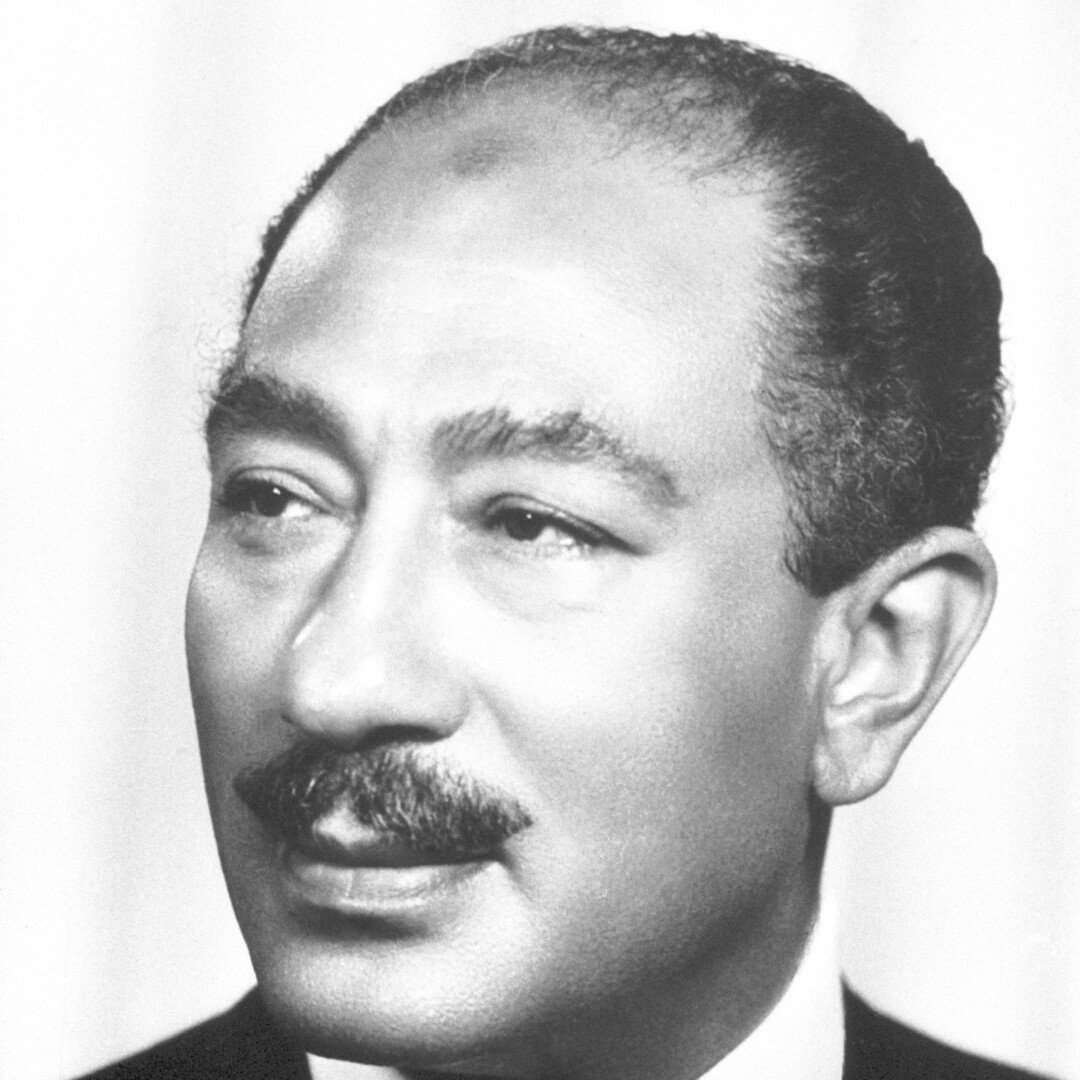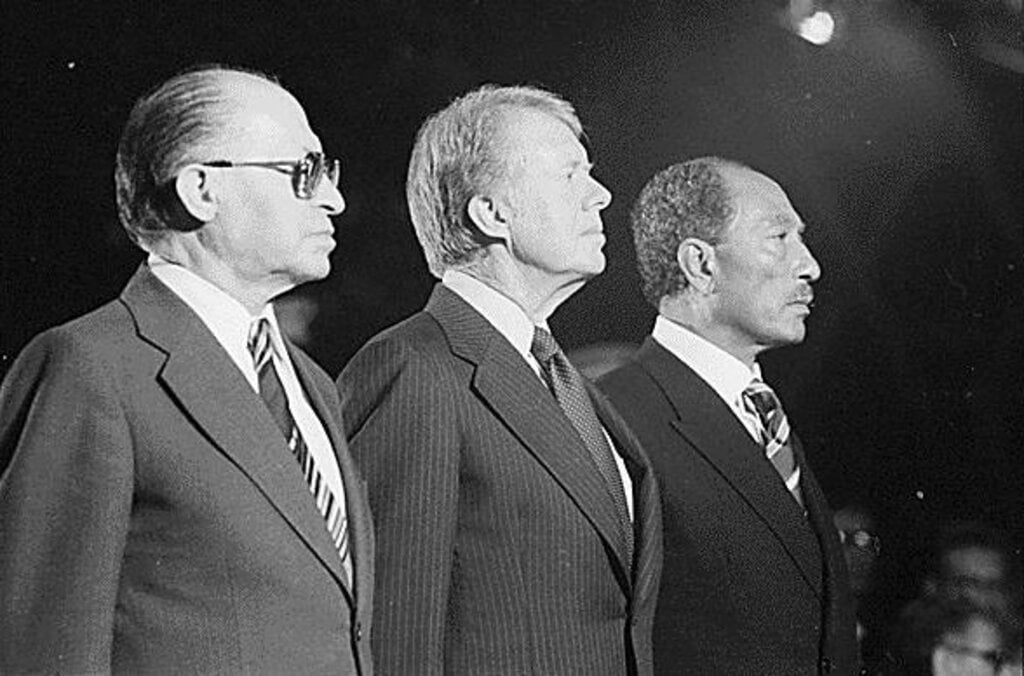Anwar al-Sadat
Speed read
Mohammad Anwar al-Sadat was awarded the Nobel Peace Prize, jointly with Menachem Begin, for negotiating a peace agreement between Egypt and Israel in 1978.

Full name: Mohamed Anwar al-Sadat
Born: 25 December 1918, Mit Abu al-Kawm, Egypt
Died: 6 October 1981, Cairo, Egypt
Date awarded: 27 October 1978
Seeking peace with Israel
In 1967, Israel seised the Sinai Peninsula from Egypt. Three years later, Anwar Sadat became the president of Egypt. He cut all ties to the Soviet Union, believing that only the USA could pressure Israel into returning occupied territory. Attracting US attention was one of the aims of the 1973 surprise attack on Israel via the Suez Canal. Although Israel had gained the upper hand by the time of the ceasefire, Egypt fought bravely, earning Sadat great respect. Nurturing close ties to US politicians, Sadat became a popular figure in the West. In the autumn of 1977, he courageously travelled to Jerusalem to demonstrate his willingness to seek peace. He then joined Israeli Prime Minister Menachem Begin and US President Jimmy Carter in peace talks in the USA. In 1979, these led to Israel’s returning the Sinai to Egypt in exchange for Egypt’s recognition of the State of Israel.
"It is to President Sadat´s credit that he realised that the solution to important social and economic problems in his own country demanded too the conclusion of a peace settlement with Israel."
Aase Lionæs, Chairman of the Nobel Committee, Presentation Speech, 10 December 1978.
Sadat’s path to power
Anwar Sadat grew up in Egypt under British rule, becoming an ardent nationalist and a military officer. During WWII, he admired Hitler for the way he had rebuilt Germany after its defeat in WWI. Sadat hoped that the Germans would drive the British out of Egypt. He engaged in clandestine activities against the British and their Egyptian supporters and was imprisoned for several years. In 1952, Sadat took part in a coup led by Gamal Nasser, which overthrew the pro-British administration. Sadat became one of Nasser’s most trusted associates, assuming the presidency after Nasser’s death in 1970.
"Any peace not built on justice and on the recognition of the rights of the peoples, would be a structure of sand which would crumble under the first blow."
Anwar Sadat, Nobel Prize lecture, 10 December 1978.
Sadat and the 1973 Yom Kippur War
In 1967, Israel crushed the Egyptian army and seised the Sinai Peninsula. Sadat believed the defeat was due in part to the Soviet Union’s failure to supply Egypt with suitable weaponry. When Sadat became president in 1970, he demanded more modern Soviet weapons in order to recapture the Sinai. But the Soviets wanted control over the weapons, leading Sadat to sever all ties with the Soviet Union. He then indicated his interest in peace to Israel and the USA. He was not taken seriously, so he went to war against Israel in October 1973. Although the war was not a military victory for Sadat, he gained the ear of the USA.
"He [Sadat] had the boldness to go to a war no one thought he could sustain; the moderation to move to peace immediately afterward; and the wisdom to reverse attitudes hardened by decades."
Henry Kissinger, 'The White House Years', page 1294, London 1979.
The Camp David accords
President Sadat went to war against Israel in 1973 to recapture the Sinai Peninsula. Egypt did not enjoy a military victory, but the oil-producing Arab nations raised the price of oil dramatically to support Egypt. This encouraged the USA to seek peace in the Middle East. In 1977, Jimmy Carter became president of the USA and began to exert pressure on Israel, and Sadat visited Jerusalem to initiate peace talks. Carter followed up by inviting Sadat and Israeli Prime Minister Menachem Begin to Camp David in the USA. The treaty giving the Sinai Peninsula back to Egypt, and making peace between Israel and Egypt, was signed in March 1979.

Peace became Sadat’s death warrant
Former US Secretary of State and Nobel Peace Prize laureate Henry Kissinger nominated Sadat for the peace prize. But Sadat did not travel to Oslo in the autumn of 1978 to accept it. Many believed he was disappointed in having to share it with the Israeli Prime Minister Menachem Begin, as Sadat had been the one to take the initiative for peace. Many Arabs considered Sadat a traitor because he had made peace with Israel. They believed that he had betrayed the cause of the Palestinian people. During a military parade in 1981, Anwar Sadat was assassinated by fundamentalists opposed to his policies.
Learn more
Read the biographical information about Anwar al-Sadat.
Disclaimer: Every effort has been made by the publisher to credit organisations and individuals with regard to the supply of photographs. Please notify the publishers regarding corrections.
Nobel Prizes and laureates
Six prizes were awarded for achievements that have conferred the greatest benefit to humankind. The 14 laureates' work and discoveries range from quantum tunnelling to promoting democratic rights.
See them all presented here.
